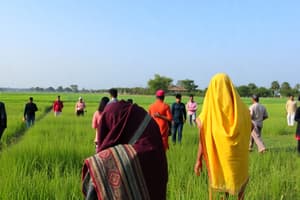Podcast
Questions and Answers
What was a significant factor leading to the development of Indian sociology as a structured discipline?
What was a significant factor leading to the development of Indian sociology as a structured discipline?
- Colonial interest in understanding Indian society and culture. (correct)
- The rejection of Western sociological methods.
- The influence of only Western scholars on Indian studies.
- Ancient Indian scholars' isolation from foreign ideas.
Which scholar is known for pioneering adult education in India?
Which scholar is known for pioneering adult education in India?
- G.S.Ghurye
- Radha Kamal Mukherjee (correct)
- M.N.Srinivas
- Iravati Karve
What was Iravati Karve's primary focus in her contributions to sociology?
What was Iravati Karve's primary focus in her contributions to sociology?
- Social Action Theory
- Kinship and the Family (correct)
- Rural Economy
- Caste and Economic dimensions
What concept is M.N.Srinivas credited with introducing in Indian sociology?
What concept is M.N.Srinivas credited with introducing in Indian sociology?
Which Indian sociologist wrote extensively on the origins of the caste system?
Which Indian sociologist wrote extensively on the origins of the caste system?
What unique perspective did Iravati Karve contribute to the study of Indian sociology?
What unique perspective did Iravati Karve contribute to the study of Indian sociology?
Which two scholars significantly focused on village societies and their transformations?
Which two scholars significantly focused on village societies and their transformations?
Which statement accurately describes the nature of Indian sociology?
Which statement accurately describes the nature of Indian sociology?
Flashcards
Indian Sociology
Indian Sociology
The study of society and its structures, particularly how they relate to India and its unique cultural landscape. It combines traditional Indian perspectives with Western sociological theories.
Colonial Influence on Indian Sociology
Colonial Influence on Indian Sociology
The colonial powers' interest in understanding India, its people, and its culture fueled the formal establishment of sociology as a discipline in India.
Early Key Figures in Indian Sociology
Early Key Figures in Indian Sociology
Radhakamal Mukherjee, G.S. Ghurye, D.P. Mukherjee, and M.N. Srinivas are some of the pioneers who shaped Indian sociology, focusing on building a unique Indian approach that explored various aspects of society.
Radhakamal Mukherjee's Contributions
Radhakamal Mukherjee's Contributions
Signup and view all the flashcards
G.S. Ghurye's Contributions
G.S. Ghurye's Contributions
Signup and view all the flashcards
M.N. Srinivas's Contributions
M.N. Srinivas's Contributions
Signup and view all the flashcards
Iravati Karve's Contributions
Iravati Karve's Contributions
Signup and view all the flashcards
N.K. Bose's Contributions
N.K. Bose's Contributions
Signup and view all the flashcards
Study Notes
Indian Sociologists
- Indian sociology emerged due to colonial interest in understanding Indian culture and society.
- Indian scholars have a long tradition of studying society and culture.
- Foreign scholars introduced new dimensions to sociological studies linking real society with textual theories.
- Indian sociology combines existing traditions with Western thought.
- Increased government involvement in studying societal dynamics.
- Focus on innovating methodologies to understand Indian society.
- Indian sociology considers historical events.
- Important sociologists (e.g., Radhakamal Mukherjee, G.S. Ghurye, D.P. Mukherjee, M.N. Srinivas) shaped Indian sociology from the 1920s to the 1980s by developing a unique tradition, but not following a universal methodology.
- Irawati Karve, K.M. Capadia, I.P. Desai, M.S.A. Rao were students of Ghurye, contributing significantly to the field.
Radha Kamal Mukherjee
- Born in Berhampore, West Bengal; grew up in Kolkata's intellectual atmosphere.
- Contributed to the study of Indian sociology in its early stages.
- Initiated adult education, highlighting social engagement.
- Experimented with social action theory based on Indian philosophy.
- Focused on field research, empirical observations, and micro-level analyses.
- Examined rural economy, land, population, and working-class problems.
- Viewed economics as a specialization, not a discipline, within social science.
- Applied sociological perspective to planning.
- Emphasized holistic approach including disciplines like political science, psychology, etc.
- Highlighted human interaction with nature and culture.
- Emphasized the interplay of environment, culture, and human adaptation.
M.N. Srinivas
- Born in Mysore, emerged in Indian sociology's development phase.
- Advocated for a strong emphasis on social change as a core theme in Indian sociology.
- Introduced the concepts of Brahminization and Sanskritization.
- Recognized the wide influence of Brahminic culture.
- Explored the adoption of Brahminic customs by lower castes to improve social status (Sanskritization).
- Recognized the mobility and influence of other dominant groups besides Brahmins.
- Analyzed the process of adapting to Brahminic culture, exploring the impact on Indian society's structure.
Irawati Karve
- First woman anthropologist in India.
- Her career spanned both colonial and post-independence periods of Indian sociology.
- Contributed to the study of kinship, caste, urbanisation, and women's role.
- Worked at Pune University focusing on kinship organization.
- Studied family structures, social customs, and women's position in Indian society.
- Analyzed kinship systems in various regions of India and compared these with practices in other cultures.
- Examined modern influences and changes in families and roles within them.
G.S. Ghurye
- Indian sociologist who studied caste and race in India.
- Critiqued racial theories of caste.
- Developed a two-race theory of India’s history.
- Emphasized the integration of diverse cultural elements in India.
- Noted the importance of kinship systems in shaping social practices.
N.K. Bose
- Indian sociologist; field research, and knowledge of tribes and castes.
- His vision of Indian caste is integrative.
- Focused on tribal absorption into Hindu society, addressing issues of integration.
- Highlighted the role of caste in organizing Indian society.
- Noted its connection with purity, pollution, and social hierarchies.
Studying That Suits You
Use AI to generate personalized quizzes and flashcards to suit your learning preferences.




